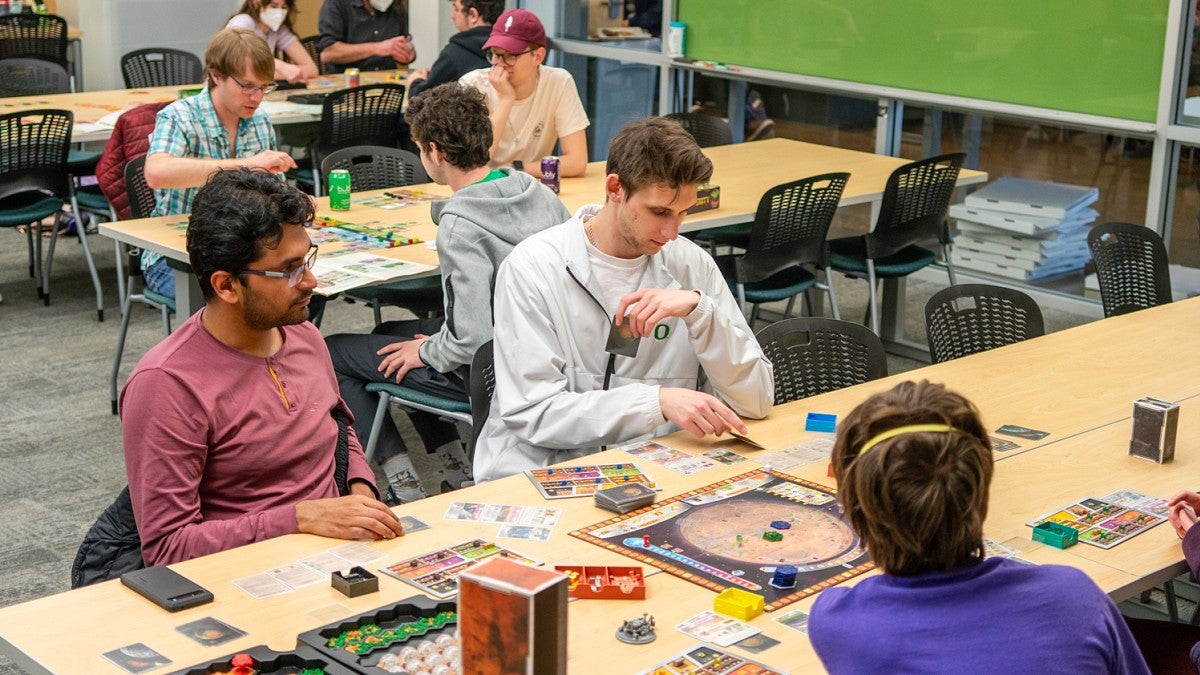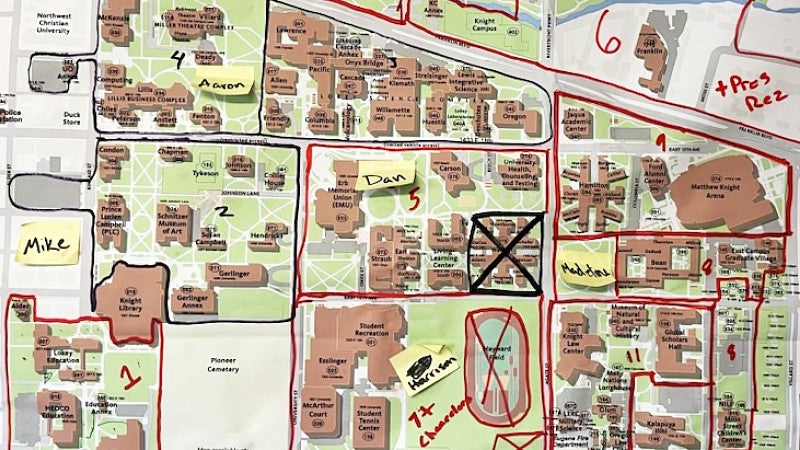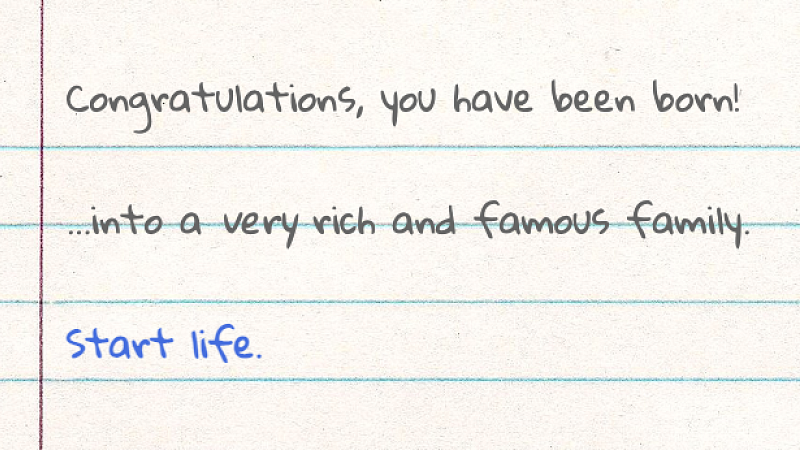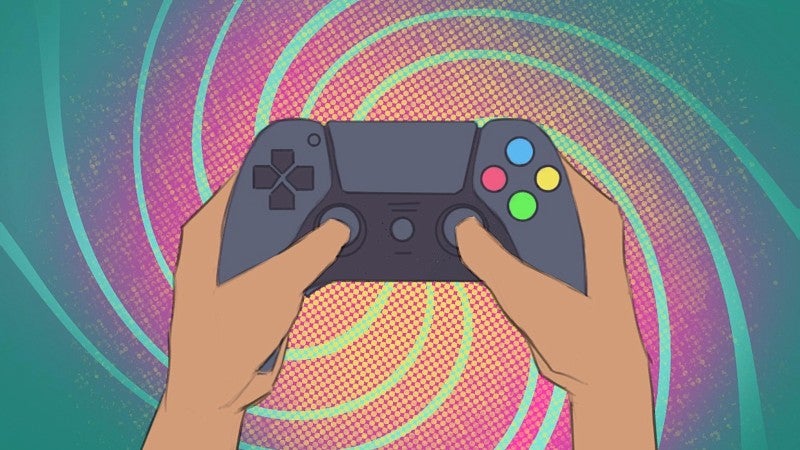
Games—from blockbuster video games to independently developed board games—are now a major cultural and economic force. They also represent a growing industry that’s actively seeking researchers, content creators, publicists, advertising creatives, and other communication and media professionals.
Analyzing and understanding the design, impact, and potential of games requires specialized knowledge and skills. The SOJC’s new game studies minor will give students a foundation for exploring this vital interdisciplinary field and its affiliated communities and scenes, understanding how they fit into broader media ecosystems and building the skills needed to get a job in this exciting field.
What Is Game Studies?
Game studies examines the cultural, social, economic, and psychological aspects of games. It blends concepts from design, art and animation, media studies, anthropology, sociology, psychology, human-computer interaction, and many other disciplines to analyze how games are created, played, and perceived around the world. Media and communication professionals who explore game studies gain deeper insights into an increasingly important medium and an industry that seeks people with strong communication skills to design content and frame it for the public.
Is the Game Studies Minor Right for You?
Do you want to pursue a career in game design, game journalism, multimedia storytelling, or video game research? Are you interested in connecting brands, public officials, or news outlets with the many digital game and immersive media play communities? Have you ever wondered how games became a dominant media form? Do you want to have a better grasp of the media and communication roles in digital games, esports, board games, tabletop role-playing games (RPGs), and virtual and augmented reality?
The game studies minor can prepare you for all these paths. Our robust curriculum will prepare you for careers as a public relations or advertising professional, game designer or script writer, multimedia creator, academic researcher, games journalist, and beyond. If you’re a future media and communication professional, you can gain an edge on a huge and growing industry by exploring the intersections of video and other types of games with technology, psychology, and culture.
The minor is open to all UO majors and explores the theories, methodologies, subjects, and practices you’ll need to understand gaming and the game industry.
What Our Students Are Up To
In a recent “Game Journalism and Newsgame” class, students were tasked with developing a “newsgame”—a game about a recent nonfiction topic—using the text-based game engine Twine. Their work, which you can find on itch.io, represents a wide variety of subjects, from interactive stories about the landscaping on campus to stepping into the shoes of a caretaker.
Groundwork to Grandeur
by Judah Naujokas
Did Famous People Get Canceled For These Things Or Did I Make It Up?
by Ana Gastelu Paez
Drugs: The Newsgame
by Hannah Baker
The Nepotism Game
by Sydney Burdick
How It Works
As a student enrolled in the game studies minor, you will take courses in the School of Journalism and Communication and other UO programs that address elements of games and the gaming industry.
Credits: The minor requires 24 credits that you can complete at any point in your college career.
Required Course 4 credits
- JCOM 280 Intro to Studying Games: This foundation course surveys key concepts and approaches to analyzing games, their industry, and their impact on social and cultural identities.
Elective Courses 20 credits/5 courses
With its flexible electives, you can tailor the minor to your interests in sociology, anthropology, folklore, game design, culture, media theory, computer science, or multimedia storytelling. Contact Maxwell Foxman, the minor’s director, with questions about other game-related classes on campus that may count toward the minor.
- JCOM 380 The Games Industry: This course will cover the shape and structure of the global games industry—its producers, value chains, sales, and industrial logics—and its key critical questions. Through a combination of academic research, documentaries, activities, and hands-on game design, you will gain a broad understanding of what it takes for games to get from idea to final product, and the hurdles along the way.
- JCOM 381 Theories of Play in Media and Communication: This course provides a foundation for comprehending what play is and its relationship to culture and media. The class connects play to concepts surrounding communication; reveals the importance of play in history, psychology, and game design; and situates play in modern media and internet cultures. You will use and analyze play in a variety of media formats and engage in play to understand its impact on your life.
- JCOM 382 Game Design and Critique: This course will guide you through the initial stages of creating a game. You’ll consider your design philosophy, pitch a game idea, and develop and playtest a working prototype, drawing on game design textbooks as well as articles and videos from professional game designers to guide your projects. By the end of the course, you will have a working game prototype and a more in-depth knowledge of how game makers function.
- JCOM 383 Understanding E-Sports: This class covers the foundational pillars of esports, from defining them to discussing key issues around players and teams, business structures and management, media and communication, as well as challenges. You will end the term with an in-depth understanding of the esports ecosystem and an analytic perspective on how this rising industry articulates with broader media and entertainment, social, and cultural spheres.
- JCOM 480 Gamification and the Media: This course will give you tools to analyze, critique, and make use of game elements in your media productions. Through a historical analysis of the concept of gamification, studies of its benefit in a variety of communications and affiliated fields, analysis of platforms that use game elements, and its connections to cultural and social issues, the course will help you understand the nuances of using games, game design thinking, and game elements in your work.
- JCOM 481 Making the Virtual a Reality: This course will introduce you to immersive media’s rich foundational scholarship, stretching from theorists like Plato through 20th-century thinkers to contemporary pioneers in media psychology. It will also equip you with theoretical and practical tools to assess trends like platformization, digital surveillance, and algorithmic bias and teach you to evaluate and write about all modes of immersive media.
- JCOM 482 Analog Games: This class will analyze analog games, including classic card, dice, and tile games; the crossword craze of the 1920s and puzzle games; modern board games and tabletop games; and the rise of “actual play” media, including the popular streaming show Critical Role. You’ll evaluate key issues in game history, mechanics and design, and social impacts, combining hands-on game play and critique with academic and popular readings to understand how analog games contribute to entertainment culture.
- JCOM 483 Game Journalism and Newsgames: This class ties together the coverage and use of games in journalism, exposes you to key types of video game reporting, and gives you the tools to recognize and critique common frames and story types. You’ll learn practical skills to use games in any story and think about how you can playfully and gamefully represent a variety of subjects using off-the-shelf tools to tell innovative stories that only games can relay.
Students who meet the prerequisites for the following College of Design Art and Technology courses may use them toward the 20 required elective credits:
- ARTD 252 Interactive Digital Arts
- ARTD 361 Introduction to Animation
- ARTD 370 Digital Interactivity







